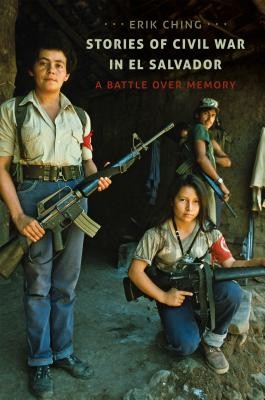
- We will send in 10–14 business days.
- Author: Erik Ching
- Publisher: University of North Carolina Press
- Year: 2016
- Pages: 362
- ISBN-10: 146962866X
- ISBN-13: 9781469628660
- Format: 15.7 x 23.6 x 2.4 cm, minkšti viršeliai
- Language: English
- SAVE -10% with code: EXTRA
Reviews
Description
El Salvador's civil war began in 1980 and ended twelve bloody years later. It saw extreme violence on both sides, including the terrorizing and targeting of civilians by death squads, recruitment of child soldiers, and the death and disappearance of more than 75,000 people. Examining El Salvador's vibrant life-story literature written in the aftermath of this terrible conflict--including memoirs and testimonials--Erik Ching seeks to understand how the war has come to be remembered and rebattled by Salvadorans and what that means for their society today.
Ching identifies four memory communities that dominate national postwar views: civilian elites, military officers, guerrilla commanders, and working class and poor testimonialists. Pushing distinct and divergent stories, these groups are today engaged in what Ching terms a "narrative battle" for control over the memory of the war. Their ongoing publications in the marketplace of ideas tend to direct Salvadorans' attempts to negotiate the war's meaning and legacy, and Ching suggests that a more open, coordinated reconciliation process is needed in this postconflict society. In the meantime, El Salvador, fractured by conflicting interpretations of its national trauma, is hindered in dealing with the immediate problems posed by the nexus of neoliberalism, gang violence, and outmigration.
EXTRA 10 % discount with code: EXTRA
The promotion ends in 21d.16:56:58
The discount code is valid when purchasing from 10 €. Discounts do not stack.
- Author: Erik Ching
- Publisher: University of North Carolina Press
- Year: 2016
- Pages: 362
- ISBN-10: 146962866X
- ISBN-13: 9781469628660
- Format: 15.7 x 23.6 x 2.4 cm, minkšti viršeliai
- Language: English English
El Salvador's civil war began in 1980 and ended twelve bloody years later. It saw extreme violence on both sides, including the terrorizing and targeting of civilians by death squads, recruitment of child soldiers, and the death and disappearance of more than 75,000 people. Examining El Salvador's vibrant life-story literature written in the aftermath of this terrible conflict--including memoirs and testimonials--Erik Ching seeks to understand how the war has come to be remembered and rebattled by Salvadorans and what that means for their society today.
Ching identifies four memory communities that dominate national postwar views: civilian elites, military officers, guerrilla commanders, and working class and poor testimonialists. Pushing distinct and divergent stories, these groups are today engaged in what Ching terms a "narrative battle" for control over the memory of the war. Their ongoing publications in the marketplace of ideas tend to direct Salvadorans' attempts to negotiate the war's meaning and legacy, and Ching suggests that a more open, coordinated reconciliation process is needed in this postconflict society. In the meantime, El Salvador, fractured by conflicting interpretations of its national trauma, is hindered in dealing with the immediate problems posed by the nexus of neoliberalism, gang violence, and outmigration.


Reviews